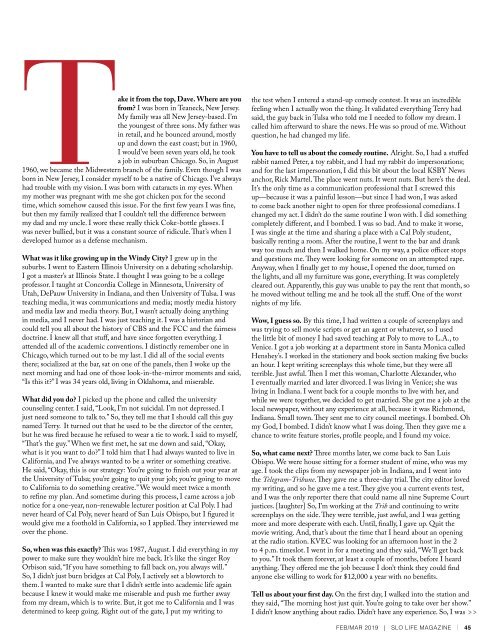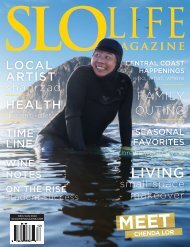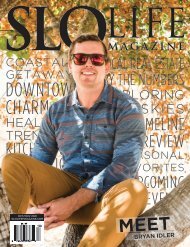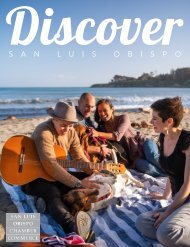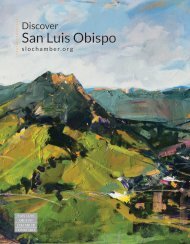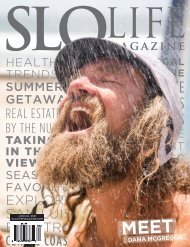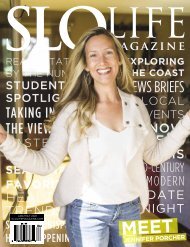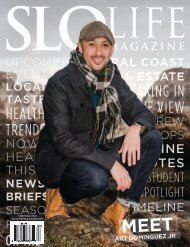Create successful ePaper yourself
Turn your PDF publications into a flip-book with our unique Google optimized e-Paper software.
ake it from the top, Dave. Where are you<br />
from? I was born in Teaneck, New Jersey.<br />
My family was all New Jersey-based. I’m<br />
the youngest of three sons. My father was<br />
in retail, and he bounced around, mostly<br />
up and down the east coast; but in 1960,<br />
I would’ve been seven years old, he took<br />
a job in suburban Chicago. So, in August T1960, we became the Midwestern branch of the family. Even though I was<br />
born in New Jersey, I consider myself to be a native of Chicago. I’ve always<br />
had trouble with my vision. I was born with cataracts in my eyes. When<br />
my mother was pregnant with me she got chicken pox for the second<br />
time, which somehow caused this issue. For the first few years I was fine,<br />
but then my family realized that I couldn’t tell the difference between<br />
my dad and my uncle. I wore these really thick Coke-bottle glasses. I<br />
was never bullied, but it was a constant source of ridicule. That’s when I<br />
developed humor as a defense mechanism.<br />
What was it like growing up in the Windy City? I grew up in the<br />
suburbs. I went to Eastern Illinois University on a debating scholarship.<br />
I got a master’s at Illinois State. I thought I was going to be a college<br />
professor. I taught at Concordia College in Minnesota, University of<br />
Utah, DePauw University in Indiana, and then University of Tulsa. I was<br />
teaching media, it was communications and media; mostly media history<br />
and media law and media theory. But, I wasn’t actually doing anything<br />
in media, and I never had. I was just teaching it. I was a historian and<br />
could tell you all about the history of CBS and the FCC and the fairness<br />
doctrine. I knew all that stuff, and have since forgotten everything. I<br />
attended all of the academic conventions. I distinctly remember one in<br />
Chicago, which turned out to be my last. I did all of the social events<br />
there; socialized at the bar, sat on one of the panels, then I woke up the<br />
next morning and had one of those look-in-the-mirror moments and said,<br />
“Is this it?” I was 34 years old, living in Oklahoma, and miserable.<br />
What did you do? I picked up the phone and called the university<br />
counseling center. I said, “Look, I’m not suicidal. I’m not depressed. I<br />
just need someone to talk to.” So, they tell me that I should call this guy<br />
named Terry. It turned out that he used to be the director of the center,<br />
but he was fired because he refused to wear a tie to work. I said to myself,<br />
“That’s the guy.” When we first met, he sat me down and said, “Okay,<br />
what is it you want to do?” I told him that I had always wanted to live in<br />
California, and I’ve always wanted to be a writer or something creative.<br />
He said, “Okay, this is our strategy: You’re going to finish out your year at<br />
the University of Tulsa; you’re going to quit your job; you’re going to move<br />
to California to do something creative.” We would meet twice a month<br />
to refine my plan. And sometime during this process, I came across a job<br />
notice for a one-year, non-renewable lecturer position at Cal Poly. I had<br />
never heard of Cal Poly, never heard of San Luis Obispo, but I figured it<br />
would give me a foothold in California, so I applied. They interviewed me<br />
over the phone.<br />
So, when was this exactly? This was 1987, August. I did everything in my<br />
power to make sure they wouldn’t hire me back. It’s like the singer Roy<br />
Orbison said, “If you have something to fall back on, you always will.”<br />
So, I didn’t just burn bridges at Cal Poly, I actively set a blowtorch to<br />
them. I wanted to make sure that I didn’t settle into academic life again<br />
because I knew it would make me miserable and push me further away<br />
from my dream, which is to write. But, it got me to California and I was<br />
determined to keep going. Right out of the gate, I put my writing to<br />
the test when I entered a stand-up comedy contest. It was an incredible<br />
feeling when I actually won the thing. It validated everything Terry had<br />
said, the guy back in Tulsa who told me I needed to follow my dream. I<br />
called him afterward to share the news. He was so proud of me. Without<br />
question, he had changed my life.<br />
You have to tell us about the comedy routine. Alright. So, I had a stuffed<br />
rabbit named Peter, a toy rabbit, and I had my rabbit do impersonations;<br />
and for the last impersonation, I did this bit about the local KSBY News<br />
anchor, Rick <strong>Mar</strong>tel. The place went nuts. It went nuts. But here’s the deal.<br />
It’s the only time as a communication professional that I screwed this<br />
up—because it was a painful lesson—but since I had won, I was asked<br />
to come back another night to open for three professional comedians. I<br />
changed my act. I didn’t do the same routine I won with. I did something<br />
completely different, and I bombed. I was so bad. And to make it worse,<br />
I was single at the time and sharing a place with a Cal Poly student,<br />
basically renting a room. After the routine, I went to the bar and drank<br />
way too much and then I walked home. On my way, a police officer stops<br />
and questions me. They were looking for someone on an attempted rape.<br />
Anyway, when I finally get to my house, I opened the door, turned on<br />
the lights, and all my furniture was gone, everything. It was completely<br />
cleared out. Apparently, this guy was unable to pay the rent that month, so<br />
he moved without telling me and he took all the stuff. One of the worst<br />
nights of my life.<br />
Wow, I guess so. By this time, I had written a couple of screenplays and<br />
was trying to sell movie scripts or get an agent or whatever, so I used<br />
the little bit of money I had saved teaching at Poly to move to L.A., to<br />
Venice. I got a job working at a department store in Santa Monica called<br />
Henshey’s. I worked in the stationery and book section making five bucks<br />
an hour. I kept writing screenplays this whole time, but they were all<br />
terrible. Just awful. Then I met this woman, Charlotte Alexander, who<br />
I eventually married and later divorced. I was living in Venice; she was<br />
living in Indiana. I went back for a couple months to live with her, and<br />
while we were together, we decided to get married. She got me a job at the<br />
local newspaper, without any experience at all, because it was Richmond,<br />
Indiana. Small town. They sent me to city council meetings. I bombed. Oh<br />
my God, I bombed. I didn’t know what I was doing. Then they gave me a<br />
chance to write feature stories, profile people, and I found my voice.<br />
So, what came next? Three months later, we come back to San Luis<br />
Obispo. We were house sitting for a former student of mine, who was my<br />
age. I took the clips from my newspaper job in Indiana, and I went into<br />
the Telegram-Tribune. They gave me a three-day trial. The city editor loved<br />
my writing, and so he gave me a test. They give you a current events test,<br />
and I was the only reporter there that could name all nine Supreme Court<br />
justices. [laughter] So, I’m working at the Trib and continuing to write<br />
screenplays on the side. They were terrible, just awful, and I was getting<br />
more and more desperate with each. Until, finally, I gave up. Quit the<br />
movie writing. And, that’s about the time that I heard about an opening<br />
at the radio station. KVEC was looking for an afternoon host in the 2<br />
to 4 p.m. timeslot. I went in for a meeting and they said, “We’ll get back<br />
to you.” It took them forever, at least a couple of months, before I heard<br />
anything. They offered me the job because I don’t think they could find<br />
anyone else willing to work for $12,000 a year with no benefits.<br />
Tell us about your first day. On the first day, I walked into the station and<br />
they said, “The morning host just quit. You’re going to take over her show.”<br />
I didn’t know anything about radio. Didn’t have any experience. So, I was >><br />
FEB/MAR <strong>2019</strong> | <strong>SLO</strong> <strong>LIFE</strong> MAGAZINE | 45


